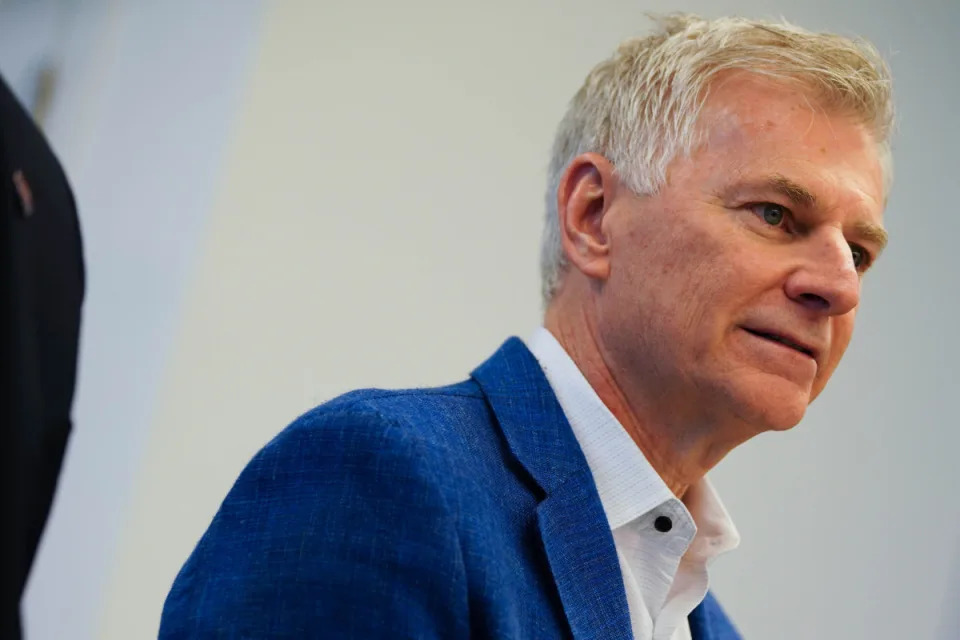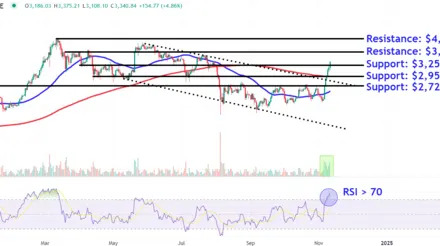It's the dogfight that never left the ground.
Southwest Airlines ( LUV ) executives and Elliott Investment Management have been engaged in fierce battle over who should take the controls of the Dallas, Texas-based air carrier.
Related: Southwest Airlines' Succession-style boardroom battle
The hedge fund now holds 10% of Southwest Airlines' stock, crossing the threshold that allows the hedge fund to call a special meeting at the carrier, Reuters reported on Sept. 2, citing a person familiar with the matter.
Elliott, which had taken an 11% economic stake through derivatives, converted enough of those holdings into common shares to cross the 10% threshold.
The news comes days before the two sides are scheduled to meet on Sept. 9 to discuss ways to solve problems that have contributed to Southwest's stock losing roughly half its value over the last three years.
Southwest’s Investor Day is slated for Sept. 26 and third-quarter results are expected to be released on Oct. 24.
The airline, which has posted a series of disappointing earnings reports, said in July that it was getting rid of its beloved 50-year-old seating policy as one of several steps to start making a profit.
Elliott called the commitment "too little, too late" and continued with its efforts to try to shake up Southwest's leadership.

Bloomberg/Getty Images
Southwest chairman: 'we have the right team'
The hedge fund, one of the world's most powerful activist investors with $70 billion in assets under management, has demanded the ouster of CEO Robert Jordan and Executive Chairman Gary Kelly. It also laid out plans to nominate 10 directors to the airline's 15-person board.
Elliott has indicated that it is ready to take next steps, including calling a special meeting, unless the company is willing to discuss changes to its leadership.
Related: Analysts update Southwest Airlines stock price target on revenue plan
A special meeting, used to solicit shareholder votes on matters that cannot wait until the next annual gathering, is rare.
On July 3, Southwest adopted a so-called “poison pill” shareholder rights plan that would make it harder for an investor to accumulate more than 12.5% of the stock.
Kelly
said that
in light of the potential for Elliott to significantly increase its position the company, the board determined that adopting the plan “is prudent to fulfill its fiduciary duties to all shareholders.”
“We are confident that we have the right strategy, the right plan, and the right team in place to succeed,” he said.
Jordan, Southwest's chief executive since 2022, has said he will not resign and has signaled to staff that he and other executives are ready to fight Elliott.
"They've not shown any willingness to engage in any meaningful conversations with us," Jordan said during the company's second-quarter earnings call on July 25.
"Most of that has been public personal attacks on leadership in the Board," he added "So like any shareholder, we love to engage and hear their feedback, but so far, there's been no willingness on their part to do that."
During the quarter, earnings dropped more than 46% to $367 million, or 58 cents per share, from a year ago.
Chief Financial Officer Tammy Romo told analysts that “our financial performance is not reflective of what we can and must deliver.”
"There are areas we need to improve, which we are owning and addressing as a management team," she said.
Analyst cites 'new revenue initiatives'
The airline's leadership team, Jordan said, "is focused 100% on moving the company forward on the plans that – some of which we laid out today and on transforming this company ending our desired financial returns."
He said the company would more about Southwest's 'ongoing strategic transformation of the business" during investor day, "where we will outline a comprehensive plan to deliver transformational commercial initiatives, improved operational efficiency, and capital allocation discipline."
More Wall Street Analysts:
Elliott, which acquired bookseller Barnes & Noble in 2019, on Aug. 13 released a list of 10 candidates it wants to see in place of most of the 15 on the airline's board now.
Most are former airline CEOs — including former Air Canada ( ACDVF ) head Robert Milton and Virgin America CEO David Cush — and other industry insiders who, the hedge fund said, will bring "relevant expertise, fresh thinking and accountability."
Southwest, in turn, said it "remain[s] open to conversations to drive Shareholder value" but stood firm behind current leadership as the ones who should drive the company forward.
Artisan Partners, whose discretionary investment management clients collectively hold more than 10.8 million shares of Southwest, or roughly 1.8% of the company's outstanding shares, said the Elliot nominees “would bring a wealth of experience to the Southwest board.”
"The current Southwest board is simply not a credible alternative to this slate of directors," the firm said on Aug. 15 . "This is not a speculative point. The current board has overseen a management team that has delivered continually deteriorating financial performance over the short, medium and long term."
Artisan urged the board to work with Elliott to immediately bring on all or substantially all of the proposed nominees “who can then chart a new course with a new chairman and CEO.”
"Enough is enough," the firm said. "Do the right thing."
Analysts at Evercore ISI weren't focusing on the boardroom air battle in their latest research note.
Despite all the flak stemming from Elliott's efforts, the firm upgraded Southwest's stock to outperform from In Line on Sept. 3, and boosted its price target to $35, up from $30, according to The Fly.
The firm also added Southwest to Evercore ISI's "Tactical Outperform" list.
While there is no change to the firm's estimates at this time, the analyst believes Southwest will update current quarter trends ahead of its investor day.
The firm pointed to the "long-awaited" transition to capacity discipline, new revenue initiatives to be outlined on Sept. 26, including assigned seating and premium economy, as well as strong underlying fleet value for its upgrade.
Related: Veteran fund manager sees world of pain coming for stocks





